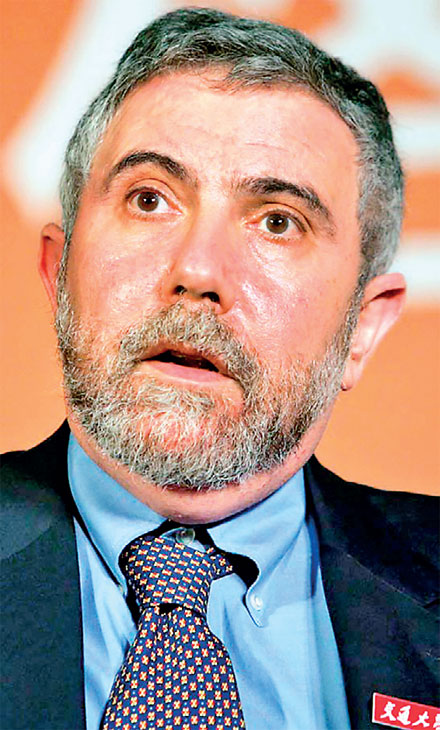Monday Feb 16, 2026
Monday Feb 16, 2026
Friday, 8 October 2021 00:00 - - {{hitsCtrl.values.hits}}

The policy framework that Paul Krugman appears to advocate is boldly expansionary in which the public debt and fiscal deficit are not seen as constraints in themselves; Krugman’s economic prescriptions however are designed primarily for the US economy

Development policy making with expectations of a better future requires a normative framework of goals and indicators that define the quality of life and state of wellbeing to which the society aspires – Pic by Shehan Gunasekara
 Recently I had the opportunity of reading Adam Tooze’s article on Paul Krugman – (‘Paul Krugman the Gatekeeper’) which appeared in the London Review of Books. The article, while being a review of Krugman’s book ‘Arguing with Zombies,’ is essentially an analysis of the shifts in Paul Krugman’s thinking over the last 30 years.
Recently I had the opportunity of reading Adam Tooze’s article on Paul Krugman – (‘Paul Krugman the Gatekeeper’) which appeared in the London Review of Books. The article, while being a review of Krugman’s book ‘Arguing with Zombies,’ is essentially an analysis of the shifts in Paul Krugman’s thinking over the last 30 years.
I thought the paper raised issues regarding the social and political processes underlying economic policy making which had relevance for a discussion which was ongoing among the Board members of the Gamani Corea Foundation regarding the priorities that should guide its research agenda. I suggested that we try to organise and stimulate a discussion on Sri Lankan policy leading to an analysis of the underlying ideological approaches and economic models that have governed Sri Lanka’s policymaking.
I was assuming that such a discourse would throw light on the inconsistencies and contradictions in the different policy frameworks we in Sri Lanka adopt to deal with the different sectors of the economy – in some cases strongly State-driven and socialist-oriented and in others enabling the market to operate freely and efficiently and private sector capitalist enterprise to thrive with the minimum of state intervention.
The alternations of power between the two major political parties in the post-independence era had produced this overarching policy mix in which the two politico-economic models co-existed with shifts in emphasis as one party succeeded the other. The Sri Lankan development strategy incorporated elements of both capitalistic and socialist models along with changes of government.
We did not subscribe to a rigid concept of consistency and continuity and use one single model for the management of the economy. We used different combinations of the state and market for different parts of the economy e.g., domestic agriculture, plantation sector, the export-oriented strategy. As I have pointed out in my own writings (e.g., ‘The Pluralistic Strategy of Development and Vision 2025-2035’) this had its own Sri Lankan character and rationale and contained both positive and negative elements.
The Krugman article deals with a relatively narrow range of economic policies – fiscal and monetary policy – and how the policies advocated by Krugman moves from a position close to the Freidman monetarist free market model to a Neo Keynesian model in which a strong state plays an active interventionist role in formulating economic policies.
The policy framework that Krugman appears to advocate is boldly expansionary in which the public debt and fiscal deficit are not seen as constraints in themselves. Krugman’s economic prescriptions (as in his book ‘End this Depression Now!’) however are designed primarily for the US economy – an economy which despite its massive public debt and fiscal deficit still remains perhaps the most credit worthy economy in the world.
The purpose of the Krugman-linked discussion
When I drew attention to the Krugman’s article and suggested a discussion, I had two main purposes in mind:
First, enabling the Gamani Corea research activities to keep abreast of the latest thinking, research and policy analysis relating to the medium- and long-term development challenges facing Sri Lanka and, second, examining Krugman’s basic premise of an economic model in which the state plays a proactive role in providing the macro policy framework of development goals and values within which the market functions. This is a normative approach and presumes a vision of the good society and a value system from which the goals are derived.
The distinction between normative and market-based economics
In suggesting the discussion, I was also making a clear distinction between the normative approach to the management of the economy and the market-based approach. I thought the discussion will focus on this distinction and spell out its implications for Sri Lankan policymaking.
The Krugman article refers to the dichotomous model in Samuelson’s work and how it deals with the state-market dichotomy; Samuelson’s economics includes both the macro level where government policies and institutions have to set the conditions for full employment and the micro level at which the market functions freely given these conditions.
Once we admit the state as a key actor in formulating policies to reach national/collective goals of wellbeing, we are assigning a role to the state and setting it in a relationship with the market which is entirely different from its place and importance in the free market model where the state has to play only a minimalist residual role and where policies follow and reinforce market trends.
In the normative approach, the goals and indicators are the main drivers of policy. The question then arises how are the goals themselves set? What is the value system which guides the selection of these goals and from what sources are they derived? All manner of questions of a very complex philosophical character arise here. In the normative approach the value system would be taken as given, deriving from the moral religio-cultural and ideological discourse that has produced the main international treaties on human rights and development and become available in global annual reports on development, primarily the Human Development Report, The Sustainable Development Report and the World Development Report.
Proponents of the free-market-minimalist-state model however reject the normative approach and adopt a positivistic empirical position and regards the overall value system as a loose aggregate of the innumerable preferences and choices of individuals as they become actualised through the market. This issue is itself the subject of interminable and inconclusive controversy which need not concern us here. For the purposes of this note I am taking the position that the normative approach is the correct approach to any type of policy making including economic policy and that the overall value system that guides the normative approach is available in the global discourse and the global reports which I have referred to above.
Proceeding on these lines the Krugman article took me to the other eminent contemporary economists who have dealt with these issues – Joseph Stiglitz, Amartya Sen and Jeffrey Sachs. All their recent writings deal with these issues of the state and market and they all take a clear position on the pro-active policy making role of the state and the paramount importance of state policies for managing the market to achieve the collective goals set by the state.
The four have much in common when it comes to the value system and the core set of development goals that should guide development policy. They have played and continue to play a major role in designing the policy frameworks that are contained in the global annual Human Development Report, the Sustainable Development Report and the World Development Report.
These reports are almost always organised around major selected themes. Each of these reports have development goals and indicators that should guide development and be used for monitoring and evaluating the state of development in a country. It should be noted that such an overall approach to development will encompass more than economic policy. The term development policy is more appropriate to describe its scope.
As the World Development Report, the most conservative and market oriented of these reports, stated in the 1991 issue, “it will include material consumption, education, health and environmental protection. Development in a broader sense is understood to include other important and related attributes as well, notably more equality of opportunity, and political freedom and civil liberties. The overall goal of development is therefore to increase the economic, political and civil rights of all people across gender, ethnic groups, religions, races, regions and countries. This goal has not changed substantially since the early 1950s, when most of the developing world emerged from colonialism” – World Bank, 1991: 31)
The finance gap and the 2021 Sustainable Development Report
Beginning from the first UN development strategy the major challenge for developing countries was to mobilise the resources to achieve these goals. The development economists defined this as the savings and investment gap and later the trade gap which developing countries face. Sachs refers to this as the finance gap for achieving the sustainable development goals by 2030.
Global estimates of the finance gap have been prepared and in the 2021 report a detailed strategy for “increasing the fiscal space of developing countries” is spelt out. These include action both at the global and national levels. Part of the debate on modern monetary theory and the role of deficit financing stems from these normative frameworks of policy that are being proposed.
Critics of this normative approach argue that the problem is created by these goal setters and their attractive slogans of achieving wellbeing for all. They say the best response is to live within one’s income like a prudent household does, not incur debts which one cannot repay and run the economy efficiently. Resource constraints and economic inequality are hard realities; we have to deal with them prudently and with practical wisdom and avoid acting irresponsibly. The proponents of this view claim to be realistic and practical as against those whom they regard as the idealists who envision a better society and in the process identify resource gaps which give rise to imprudent policies.
In contrast to this position, the normative school holds that envisioning a better society in the future and acting to realise it is the more rational and realistic approach. A large group of economists including Stiglitz, Sen, Sachs and Krugman argue that existing inequalities in income and wealth should be substantially reduced if the economy is to function efficiently and social and political stability preserved. They stress that more equitable distribution of wealth and income require more radical policies than are pursued at present.
The “realists” accept society as it is and opts for slow incremental change. The “idealists” want more rapid change and policies that promote that change. The global policy framework all of them have in mind envisage actions at the global level that ensure fiscal sustainability of the strategy that developing countries adopt for achieving the development goals.
Sachs in the 2021 Sustainable Development Report makes several concrete recommendations some of which recall the unfinished agenda of initiatives taken by UNCTAD during the Prebitsch-Corea era. In such a context reliance on deficit financing and increasing the public debt to gain the required fiscal space to achieve the development goals becomes sound macroeconomic policy.
The reality is however that such international support is not available to the extent required. In such conditions the fiscal space available to developing countries would be inadequate for the achievement of the development goals. Designing the appropriate fiscal policies in those conditions becomes much more complex and demanding.
Dr. Wijewardena’s critique of the Modern Monetary Theory (MMT) provides an excellent analysis explaining why the unrestrained application of the remedies prescribed in the MMT in Sri Lanka’s situation will have disastrous consequences. But the rejection of the MMT in Sri Lanka’s situation does not mean that we must also reject the normative approach which posits a pro-active state that makes decisions for the purpose of achieving a better society in the future based on clearly defined goals.
The value system guiding the normative approach
If one accepts that the normative approach is what human beings will always adopt, and that the “rational expectations” of human beings will always include expectations of a better future, then planning for that future and setting goals based on the values they hold will be the logical outcome. The value systems that define the goals for the future society will play a key role.
One can make mistakes in defining goals, goals could be unrealistic or outright bad but that does not do away with the need for setting goals and getting the goals right. For the purpose of our present discussion I have assumed that the global initiatives on development and their outcomes as presented in the annual reports I have referred to provide us with a value system and set of goals with which we can begin to work.
Jeffery Sachs in a recent review of two books on Keynes makes some comments about Keynes’s concept of the good life and Keynes’s view that the good life is the primary purpose of economic activity. It gives some idea of the value system that was implicit in Keynes’s economic philosophy – the overall value system that must inform all economic thinking:
“Keynes’s third idea was the most fundamental. Once Keynes realised that there was indeed a macro-economy, one that could be managed for purposes of war or to maintain the peace, for promoting prosperity over penury, he intuited and reasoned deeply that the macro-economy must be managed for the good. Economic policy must be guided by phronesis, practical wisdom for the social good. There was no reason to tolerate economic crises, still less to have them be the result of greed. Economics was a matter of choice, not just for individual consumers, but for societies as a whole. Economics, in Keynes’s hands, returned to become a moral science, where Aristotle had placed it in ‘The Politics,’ and where Adam Smith had put it in ‘The Theory of Moral Sentiments’ in 1759, before placing economics in the cause of wealth in ‘The Wealth of Nations’ in 1776.
“Keynes’s philosophy by the late 1920s was indeed a radical one, a point rightly emphasised by both Carter and Crotty, (the writers of the two books Sachs reviews). It was becoming “socialist” in one overriding sense: It aimed for the wellbeing of society as a whole. Keynes described his “liberal socialism” this way:
"[A] ‘system where we can act as an organised community for common purposes and to promote social and economic justice, whilst respecting and protecting the individual – his freedom of choice, his faith, his mind and its expression, his enterprise and his property.”
The normative approach and planning
Several basic conclusions emerge from the foregoing discussions.
First, development policy making with expectations of a better future requires a normative framework of goals and indicators that define the quality of life and state of wellbeing to which the society aspires.
Second, developing a framework of this type requires a process of comprehensive planning of a medium and long-term nature.
Third, the planning process requires an infrastructure of national level institutions with adequate human resources to undertake these tasks.
(The writer is the Chairman Emeritus, Marga Institute and Director, Gamani Corea Foundation.)